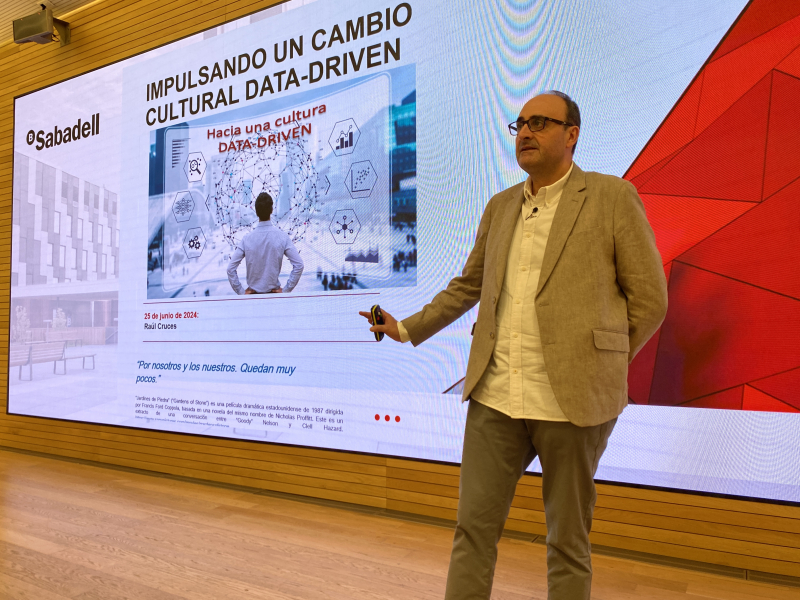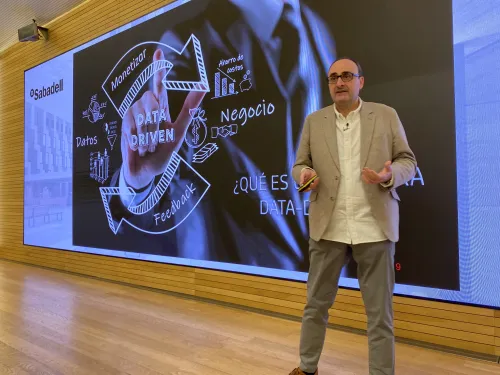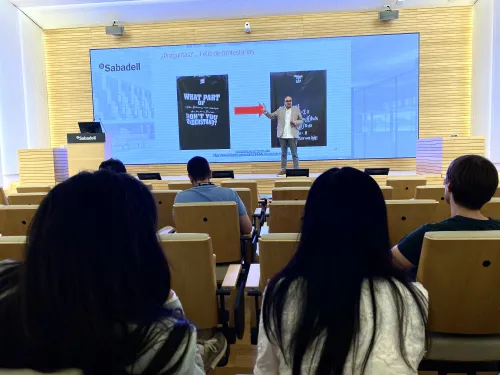As part of a new session of the DisruptIA talks season, which Banco Sabadell is organising among its employees to spread the great possibilities and the paradigm shift that Artificial Intelligence represents, the bank's auditorium in Sant Cugat hosted a talk by Raúl Cruces. This "data evangelist", as he describes himself, gave a lecture on the need for companies to have a solid foundation that provides adequate data governance and management before embarking on Artificial Intelligence projects. According to him, this process should be driven by the business areas, not by technology management, and should be supervised and supported at all times by the highest levels of management in the organisations.

Raúl Cruces held management positions in financial sector companies for more than 36 years, promoting and implementing data governance and management projects at the highest level, and coordinating the standardisation of these projects at international level. A task, he said, “that for many years has been very difficult to carry out, because the specialists dedicated to this type of task had to overcome a lot of resistance within the companies”. Now, thanks to the advent of Artificial Intelligence and all that it entails, “it seems that we have become fashionable”, he said, “and data governance and management has become part of the management priorities in business organisations”.
Raúl Cruces: “Before implementing solid Artificial Intelligence, there must be a solid foundation that provides adequate data governance and management, and this is a cultural change that must be promoted in companies from the business units".
This message is, in fact, fully consistent with that of the previous specialists who have participated in this forum, who unanimously warned of the possible errors or biases of all kinds that Artificial Intelligence systems can produce if the data they are fed with are not reliable. Therefore, it was practically inevitable, after hearing several warnings in this regard, to organise a conference specifically focused on this topic.

The seven challenges currently faced by data managers in companies
Raúl Cruces began his talk entitled “Driving a Data-Driven Cultural Change” by detailing the seven main challenges currently facing companies considering the implementation of a reliable data governance and management system.
- Determine how data should be characterised so that it can be used to train algorithms, being the protagonists of one of those million-dollar deals that Artificial Intelligence subsequently generates.
- There is usually no one in companies who has a complete, transversal vision or responsibility for data, nor for remediation needs or new priorities. This is something that needs to be addressed.
- The Chief Data Officer is often a figure who is not really part of the top management of organisations and has a limited budget and staff. All this needs to be reviewed.
- Eliminate data silos within business organisations. Data in almost all companies, especially the larger ones, are scattered in different repositories, and controlled by different units. This way of working needs to change.
- Data exploitation must be facilitated by homogenising data, eliminating duplicates and quality problems, among other processes, as the same data is extracted, transformed and/or replicated several times.
- The reduction of End User Computers must be further advanced to achieve greater operational efficiency, consistency and security of data and to reduce costs.
- New data dashboards must be created that reflect the new needs, which must be set primarily by the business units.
As such, he put special emphasis on a concept that he considers fundamental: “From the outset, we have to give up the idea that we can manage all the data in a company. This is impossible, we will never be able to govern or manage all the data. The really important thing is to decide which ones we are going to need and concentrate on ensuring that they are processed correctly”.

A paradigm shift to be led by business management
He also referred to the structural changes that companies will have to undergo. Among other points, he highlighted how important it is to know how to combine existing talent with new entrants and senior talent with native digital talent, as well as a system of incentives to reward innovation and new ways of managing. He also mentioned the great importance of the business units, which are the ones that must lead and drive this process and not the technological units, which are often entrusted with it. “Business challenges, technology inspires and the CDO is the harmonious link that bridges the two worlds", he said. In summary, implementing a Data Driven company is not something that is limited only to the technological field, but involves modifying many internal processes within organisations. He also placed special emphasis on the fact that these organisational changes should be coordinated by committees that include the company's top management, and the CEO if possible. Otherwise, experience shows that these processes often do not achieve optimal results, due to the logical resistance to change in any organisation.
He also made reference to the importance of maintaining high ethical standards when designing and implementing these systems, as well as keeping up to date with all the legal standards that regulate them and which, according to all indications, will become stricter by the day, especially in Europe.
Artificial intelligence's future in business
Artificial intelligence is rapidly transforming the business world. The possibilities are endless, from automating processes to creating new products and services. However, companies need to invest in data management and employee training to realise the full potential of AI.
By taking a strategic approach to data management, companies can build a solid foundation to develop artificial intelligence applications that will enable them to improve efficiency, make more informed decisions and gain a competitive advantage in the marketplace.
Banco Sabadell is offering all those interested in delving deeper into this field the opportunity to watch the lectures of the DisruptIA season in full. This can be seen in the following this link.